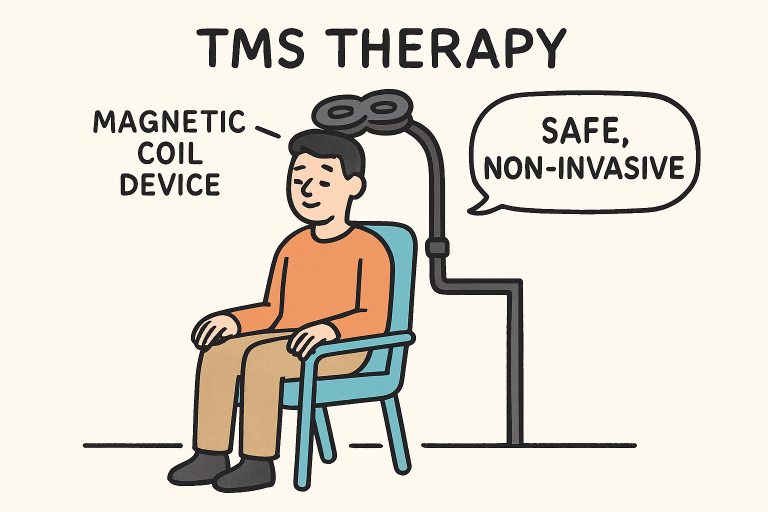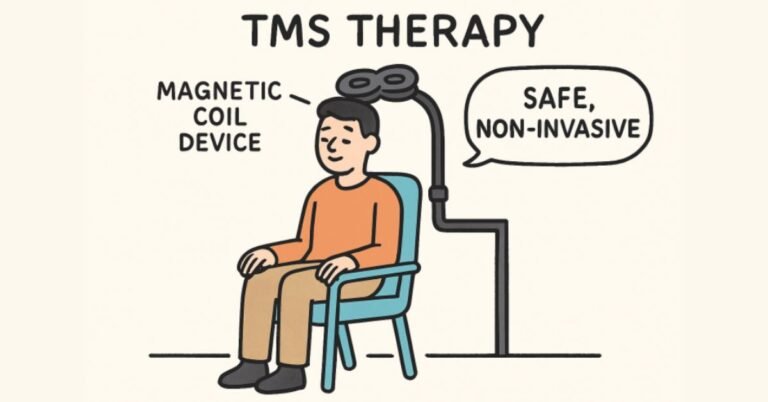Understanding Transcranial Magnetic Stimulation (TMS)
Transcranial Magnetic Stimulation (TMS) is a non-invasive brain stimulation technique that uses rapidly changing magnetic fields to activate neurons in areas that control mood. For those seeking effective, science-backed treatments beyond traditional medication, TMS therapy in Utah provides access to this innovative treatment. The process involves placing a magnetic coil near the scalp, which emits pulses that modulate brain activity, making it an attractive option for those who are not achieving results with conventional methods.
TMS is typically performed as an outpatient procedure, allowing people to maintain their regular activities during the course of treatment. Sessions are usually brief, lasting around 20-40 minutes, and are scheduled daily over several weeks, depending on the individual’s needs and the specific depression diagnosis.
How TMS Differs from Traditional Treatments
Unlike oral antidepressants that circulate throughout the body, TMS is localized—focused directly on regions of the brain associated with mood regulation. This targeted approach leads to fewer systemic side effects such as weight gain, drowsiness, or sexual dysfunction, which are commonly reported with standard antidepressant medications. Furthermore, TMS does not require anesthesia or hospitalization, distinguishing it from other brain stimulation therapies like electroconvulsive therapy (ECT), which may cause memory loss or cognitive impairment.
TMS is also unique in its suitability for patients who have not benefited from more than one antidepressant trial. By offering an alternative route for those with treatment-resistant depression, TMS fills a crucial gap in mental health care, often enabling significant improvements in daily functioning and quality of life.
Effectiveness of TMS in Treating Depression
Large-scale clinical studies have demonstrated that TMS is effective in reducing symptoms of depression, particularly for those with treatment-resistant depression. In a notable randomized trial, patients who received TMS were significantly more likely to experience remission compared to those who switched to another antidepressant.
The benefits of TMS extend beyond clinical scores. Many patients report improved emotional resilience and a greater ability to engage in social, occupational, and family activities, underscoring the therapy’s meaningful impact beyond simply alleviating symptoms.

Types of Depression Treatable with TMS
TMS is FDA-cleared for use in treating major depressive disorder and has also demonstrated effectiveness in cases classified as treatment-resistant depression. This versatility means that TMS may benefit those with chronic, severe, or recurrent depressive episodes who have cycled through multiple therapies without success. Some clinicians are also exploring its use in related psychiatric conditions such as anxiety disorders and obsessive-compulsive disorder, broadening the scope of TMS applications as the research base expands. According to U.S. News & World Report, TMS has become an increasingly recognized option for patients seeking non-invasive treatments when traditional medications and therapies fall short. Its non-invasive nature and relatively mild side effect profile make it an appealing alternative for many patients navigating complex treatment histories.
Advantages of TMS Over Other Treatments
- Non-Invasive Procedure: TMS does not involve surgery, implanted electrodes, or anesthesia, which reduces risk compared to more invasive procedures.
- Minimal Side Effects: The therapy is generally well-tolerated. Most people experience only mild scalp discomfort or transient headaches during or after treatment sessions.
- No Systemic Impact: TMS does not cause the common side effects often seen with antidepressant drugs, such as fatigue or sexual dysfunction, making it an appealing option for those sensitive to medications.
- Outpatient Convenience: The ability to return to regular activities immediately after each session heightens the accessibility and usability of TMS therapy.
Considerations and Limitations
As with any medical intervention, TMS therapy comes with specific factors to consider. A full course of TMS typically involves daily sessions (five days a week) spanning four to six weeks, which may represent a significant time commitment. While many insurance providers now cover TMS after the failure of multiple antidepressant trials, some costs may still be out of pocket, depending on specific plans and provider requirements.
- Time Commitment: The multi-week, daily session schedule may be challenging for those with limited flexibility in their work or personal life.
- Financial Costs: Insurance coverage varies, and patients should confirm their eligibility with their carrier to anticipate potential expenses.
- Patient Suitability: Not all individuals are candidates for TMS. Those with a history of seizures, specific brain injuries, or implanted metal devices may not be eligible and should discuss risks with their healthcare provider.
Future Directions in TMS Research
Current research efforts are focusing on refining the precision and effectiveness of TMS. Scientists are investigating newer coil designs that enhance stimulation accuracy and comfort and exploring the potential for shorter, more intensive courses. There’s also increasing interest in using TMS alongside psychotherapy or medication for a synergistic effect. As understanding deepens, TMS may expand its reach to benefit an even broader population living with mood disorders.
Additionally, technological advances are making it easier to personalize treatment protocols based on individual brain patterns, further increasing the likelihood of positive outcomes for those who have struggled with depression for years.
Conclusion
Transcranial Magnetic Stimulation is redefining what’s possible for people with depression who have exhausted other options. With a strong safety profile, minimal side effects, and a growing scientific foundation, TMS therapy stands as a beacon of hope in modern mental health care—offering relief and renewed optimism for those who may have felt out of reach of effective treatment.

